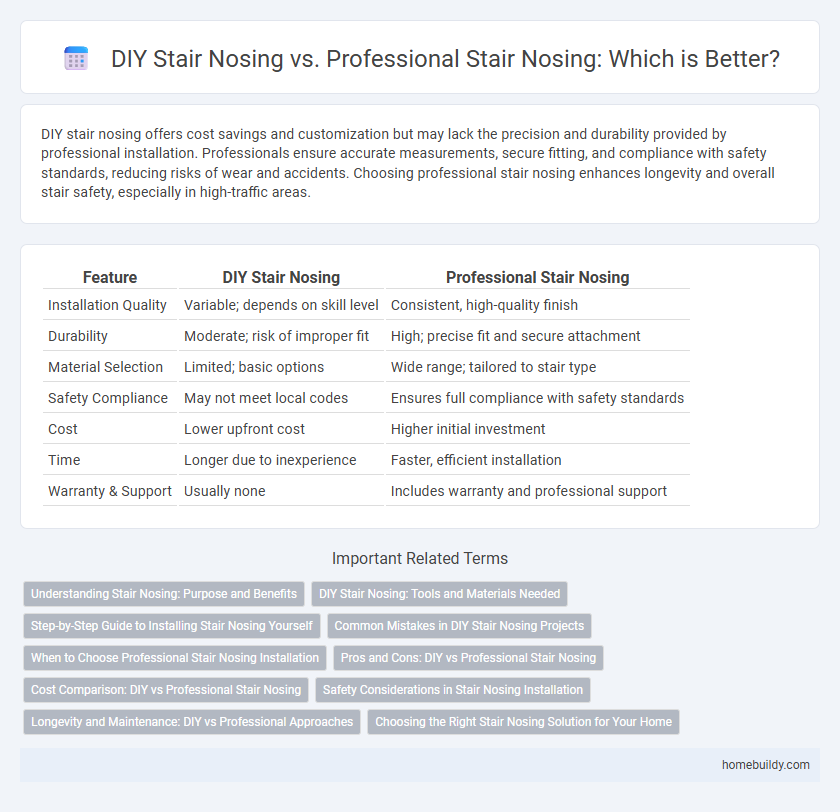DIY stair nosing offers cost savings and customization but may lack the precision and durability provided by professional installation. Professionals ensure accurate measurements, secure fitting, and compliance with safety standards, reducing risks of wear and accidents. Choosing professional stair nosing enhances longevity and overall stair safety, especially in high-traffic areas.
Table of Comparison
| Feature | DIY Stair Nosing | Professional Stair Nosing |
|---|---|---|
| Installation Quality | Variable; depends on skill level | Consistent, high-quality finish |
| Durability | Moderate; risk of improper fit | High; precise fit and secure attachment |
| Material Selection | Limited; basic options | Wide range; tailored to stair type |
| Safety Compliance | May not meet local codes | Ensures full compliance with safety standards |
| Cost | Lower upfront cost | Higher initial investment |
| Time | Longer due to inexperience | Faster, efficient installation |
| Warranty & Support | Usually none | Includes warranty and professional support |
Understanding Stair Nosing: Purpose and Benefits
Stair nosing enhances stair safety by providing improved grip and visibility, reducing slip risks on stair edges. DIY stair nosing installation can save costs but requires precise measurement and skill to ensure durability and compliance with safety standards. Professional stair nosing services guarantee expert fitting, material quality, and long-term performance, crucial for high-traffic or commercial stairs.
DIY Stair Nosing: Tools and Materials Needed
DIY stair nosing requires precise tools such as a measuring tape, miter saw, drill, screws, and adhesive to ensure secure installation. Common materials include aluminum, vinyl, or wood stair nosing strips, selected based on durability, aesthetics, and stair type. Proper surface preparation and accurate cutting are essential to achieve a professional finish and enhance stair safety.
Step-by-Step Guide to Installing Stair Nosing Yourself
Installing stair nosing yourself involves measuring each step precisely, cutting the nosing material to fit, and securing it with appropriate adhesives or screws to ensure durability and safety. Using tools such as a miter saw for accurate cuts and a drill for fastening guarantees a professional finish without hiring experts. Following a step-by-step guide helps DIY enthusiasts avoid common mistakes like uneven placement or loose attachments, enhancing both stair aesthetics and longevity.
Common Mistakes in DIY Stair Nosing Projects
DIY stair nosing projects often result in common mistakes such as improper measurements, leading to uneven or poorly fitting installations that compromise safety and durability. Incorrect adhesive application can cause stair nosing to loosen prematurely, increasing the risk of slips and falls. Professional stair nosing services ensure precise fitting, secure attachment, and compliance with building codes, enhancing both the aesthetic appeal and long-term functionality of staircases.
When to Choose Professional Stair Nosing Installation
Professional stair nosing installation is essential for complex staircases requiring precise measurements and secure fitting to meet safety standards and building codes. When stairs have irregular shapes, high foot traffic, or require custom materials like aluminum or rubber with enhanced slip resistance, professional expertise ensures durability and optimal performance. Choosing experts minimizes installation errors, prevents costly repairs, and guarantees compliance with legal regulations for stair safety.
Pros and Cons: DIY vs Professional Stair Nosing
DIY stair nosing offers cost savings and customization flexibility but requires precise measurements and installation skills to avoid safety hazards and durability issues. Professional stair nosing ensures expert fitting, adherence to building codes, and long-lasting results, though it involves higher upfront costs and scheduling considerations. Evaluating the trade-offs between budget constraints and quality guarantees helps determine the best approach for safe and effective stair edging solutions.
Cost Comparison: DIY vs Professional Stair Nosing
DIY stair nosing offers significant cost savings by eliminating labor fees, with average material expenses ranging between $3 and $10 per linear foot, depending on the material type like aluminum or vinyl. Professional installation typically costs between $10 and $25 per linear foot, including both materials and skilled labor, ensuring precise fitting and compliance with safety standards. While DIY projects reduce upfront costs, professional stair nosing installations provide long-term durability and risk mitigation that can justify the higher initial investment.
Safety Considerations in Stair Nosing Installation
DIY stair nosing installation often risks improper alignment and insufficient adhesion, which can lead to tripping hazards and reduced durability. Professional stair nosing installers ensure compliance with building codes and use specialized tools to achieve secure attachment, enhancing safety and longevity. Proper installation of stair nosing is critical in preventing slips, falls, and injuries on staircases.
Longevity and Maintenance: DIY vs Professional Approaches
Professional stair nosing installation ensures superior longevity due to precise fitting techniques and use of premium adhesives, which significantly reduce wear and tear over time. DIY stair nosing may result in uneven application, leading to premature damage and increased maintenance requirements. Regular upkeep is easier with professionally installed nosing, as it maintains structural integrity and resists loosening or cracking under heavy foot traffic.
Choosing the Right Stair Nosing Solution for Your Home
Selecting the right stair nosing solution hinges on factors like durability, safety, and installation complexity. DIY stair nosing kits often suit budget-conscious homeowners with basic skills, providing adequate slip resistance and aesthetic appeal. Professional stair nosing services ensure precise fitting, compliance with building codes, and long-term performance, ideal for high-traffic areas or intricate stair designs.
DIY stair nosing vs Professional stair nosing Infographic

 homebuildy.com
homebuildy.com